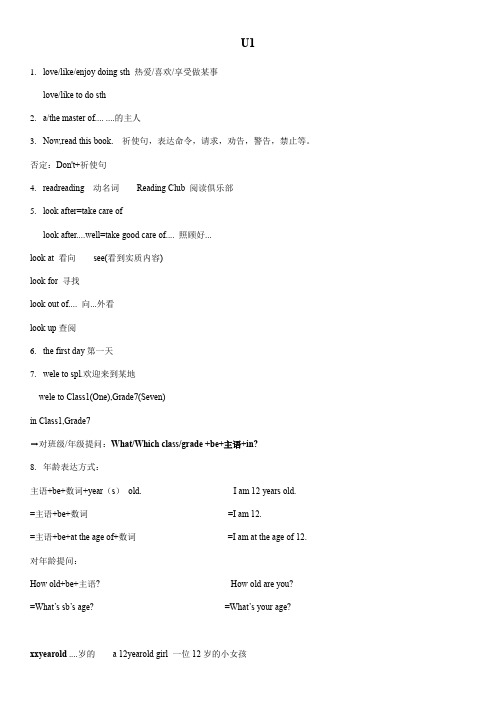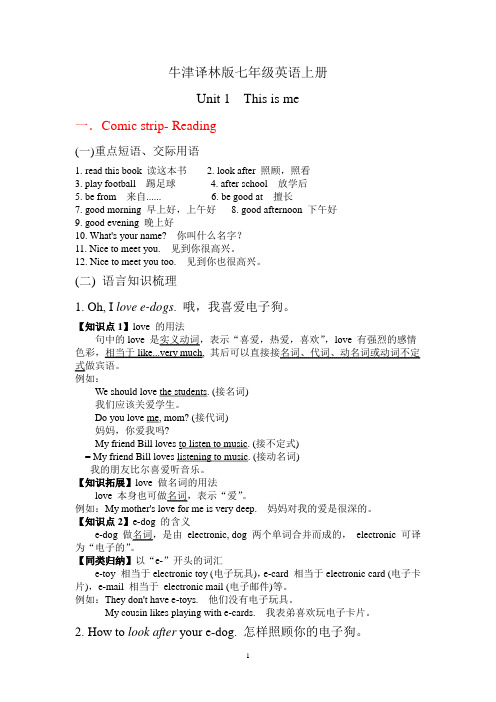牛津译林版七年级上册英语Unit1知识点总结
牛津译林版英语七年级上册分单元知识点归纳总结(Unit1-8))

牛津译林版英语七年级上册全册知识点归纳总结(最新)Unit one一、词汇知识点整理:look after \ take care of 照顾;表示look 的短语:look after照顾look at 看…;look for 寻找look like 看起来像…on the first day 在第一天Class One, Grade Seven (先说班级,再说年级,且大写)。
play football 踢足球after school 放学后be\come from 来自be good at \do well in 擅长fly kites 放风筝go home 回家listen to music 听音乐play a game 玩游戏wear glasses 戴眼镜at school 在学校all the lessons 所有的课程talk about 谈论over there 那里 a lot of hobbies 许多爱好二、结构用法:love\like doing sth 喜欢做某事let’s +动词原形让我们I am\My name is 我叫welcome to +地点欢迎来到This is 这是be good at \do well in doing 擅长做in Class…Grade…在几年级几班be from = come from + 地点, 意思是“来自某地”。
He is from Nanjing. P8 他来自南京。
live with…in…和谁住在哪里live with sb 和某人住一起;live in+ 城市名,住在某地;live on the ground floor 住在一楼(用介词on)I’m …year old. 我几岁了。
year(s) old ,……岁,如果数词大于1,year 要用复数years. 问年龄要用How old “几岁”提问。
例如:- is your sister? --- She is 11. 应填How old.I have (short/long)hair.我留着短(长)头发三、句式用法What’s your name?你叫什么名字?Nice to meet you! 很高兴见到你。
牛津译林版英语七年级上册分单元知识点归纳总结(Unit1-8))

牛津译林版英语七年级上册全册知识点归纳总结(最新)一、词汇知识点整理:\ 照顾 ;表示的短语:照顾看…;寻找看起来像…在第一天 , (先说班级,再说年级,且大写)。
踢足球放学后\ 来自 \ 擅长放风筝回家听音乐 a 玩游戏戴眼镜在学校所有的课程谈论那里 a 许多爱好二、结构用法:\ 喜欢做某事’s +动词原形让我们I \ 我叫+地点欢迎来到这是\ 擅长做……在几年级几班= + 地点, 意思是“来自某地”。
Nanjing. P8 他来自南京。
……和谁住在哪里和某人住一起;城市名,住在某地;住在一楼(用介词)I’m … . 我几岁了。
(s) ,……岁,如果数词大于1,要用复数.问年龄要用“几岁”提问。
例如:- ? 11. 应填 .I ().我留着短(长)头发三、句式用法’s ?你叫什么名字?! 很高兴见到你。
I . 我喜欢阅读英语.表示“喜欢”的用法:喜欢喜爱喜欢 + 形式。
’s . 现在让我们认识下我们的新同学。
I .放学后我经常踢足球。
. 她个头很高,身材苗条。
Nanjing. 他来自南京。
Nanjing.. 他擅长于数学。
.11 .米莉11岁。
.他们都很好。
I . 我擅长于跳舞。
四、语法归纳:连系动词的一般现在时动词的三变化 .我(I)用 ,你()用用于他()她()它(),单数名词用,复数名词都用句型结构:1、肯定句:主语\\ … a .2、否定句:主语\\… a .3、一般疑问句:\\主语+其他? a ? 回答 , . , ’t4、特殊疑问句:疑问句 +主语+其他?’s ?语法小练习:用动词的适当形式填空1、 . .2、 I3、? a4、 ? , I5、 ? .一、词汇知识点整理:做运动 a 一天许多次踢足球/打网球谈论放学后去游泳a …中的一员来自听音乐在下届世界杯实现’s 在某人的空闲时间住/生活在看书在周末待在家里 a 许多问某人某事在电视上看篮球比赛感觉特棒二、结构用法:?做…怎么样?喜欢做某事使某人/某物使某人做某事想要做某事希望做某事做某事开心三、句式用法I . 我喜欢散步。
Unit1知识点梳理2023-2024学年牛津译林版英语七年级上册

第一讲 7A Unit1 Language Point 梳理一.Unit 1 重点语法1.would like / love sth.想要某物例句:Would you like some water?肯定回答:Yes, please. Yes, I’d like / love to.否定回答:No, thanks.2.would like / love to do sth.想要做某事例句:Would you like to drink some water?肯定回答: Yes, I’d like / love to.否定回答:I’d like / love to, but …… .3.糖葫芦形容词结构:数词+ 名词(单数) + (形容词)例:80foothigh 80 英尺高fiveinchtall 5英寸高的7yearold 7岁的注意:①名词必须用单数②只能放在名词前作定语,不能放在be 动词后作表语。
4.read/look/see/watch几个“看”的用法和区别:look 强调看的动作①系动词。
译作看起来,后接形容词。
She looks happy.②不及物动词。
译作看,词组:look at…,用副词修饰。
Tom looked at me angrily.see 及物动词,译作看到,无进行时态,强调看的结果。
watch 及物动词,译作观看,注视。
强调观看正在进行中的,发生变化的活动过程,常用于看电视、看球赛、看演出等。
read 及物动词,译作阅读。
强调看文字内容的东西,常用于看书、看报纸、看杂志等。
5.疑问代词what、which、who 及疑问副词how、when 、where可以和动词不定式连用。
what to do 做什么which to do 做哪个who to do 如何做how to do 谁做when to do 什么时候做where to do 在哪里做6.“疑问词+ to do” 结构经常放在know,learn,see ,ask等动词后做宾语。
Unit 1单词讲义 2024-2025学年新牛津译林版英语七年级上册

24新牛津译林版7A Unit 1 单词讲义1.greet (v.打招呼)近:welcome(v.欢迎),salute (v.敬礼) 反:ignore(v.忽视),avoid (v.避免) 派:greeting (n.问候) I always greet my neighbors with a smile when I see them. 当我看到邻居时,我总是微笑着问候他们。
2.introduce(v.介绍) 近:present (v.呈现), 反:conceal(v.隐藏), 派:introduction(n.引言/介绍)Let me introduce you to my colleague,Dr.Smith. 让我把你介绍给我的同事史密斯博士。
3.each other (phrase 彼此)近:one another (phrase互相)They looked at each other and laughed. 他们互相看了看,笑了。
4.go by(v.走过,流逝)近:pass(v.通过),elapse (v.消逝)反:stay(v.停留),remain(v.保持)派:going by (n.经过),gone by (adj.过去的)She goes by her middle name,Marie,instead of her first name. 她用她的中间名玛丽,而不是她的名字。
5.glad (adj.高兴的)近:happy (adj.快乐的),pleased(adj.满意的)反:sad(adj.悲伤的),unhappy (adj.不快乐的)派:gladly (adv.高兴地)I'm so glad you could come to my party. 你能来我的聚会,我很开心。
6.same(adj.相同的)近:identical (adj.相同的),similar (adj.相似的)反:different (adj.不同的),various(adj.多样的)派:sameness (n.相同)We have the same idea about where to go for dinner. 我们对去哪里吃饭有同样的想法。
Unit1重要知识点牛津译林版英语七年级上册

U11.love/like/enjoy doing sth 热爱/喜欢/享受做某事love/like to do sth2.a/the master of.... ....的主人3.Now,read this book. 祈使句,表达命令,请求,劝告,警告,禁止等。
否定:Don't+祈使句4.readreading 动名词Reading Club 阅读俱乐部5.look after=take care oflook after....well=take good care of.... 照顾好...look at 看向see(看到实质内容)look for 寻找look out of.... 向...外看look up查阅6.the first day第一天7.wele to spl.欢迎来到某地wele to Class1(One),Grade7(Seven)in Class1,Grade7➡对班级/年级提问:What/Which class/grade +be+主语+in?8.年龄表达方式:主语+be+数词+year(s)old. I am 12 years old.=主语+be+数词=I am 12.=主语+be+at the age of+数词=I am at the age of 12.对年龄提问:How old+be+主语? How old are you?=What’s sb’s age? =What’s your age? xxyearold ....岁的 a 12yearold girl 一位12岁的小女孩9.play+球类运动play footballplay the+乐器名词play the piano10.after class/school/lunch....11.be from=e from 来自Where +be+主语+from?=Where+助动词+主语+e from?12.be good at (doing ) sth=do well in (doing) sth 擅长做某事(=do sth well)13.★Be动词的一般现在时14.at the age of... 在...岁时15.go walking➡go+ving=go for a walkgo swimming=go for a swim16.glad/nice to meet you. ➡It's glad/nice to meet you.It’s+adj.+to do sth做某事....17.I see.我明白了。
牛津译林版七年级上册英语Unit1知识点汇总

牛津译林版七年级上册英语Unit1知识点汇总7A Unit 1 This is me!一.【精选短语】1. how to look after your e-dog如何照顾你的电子狗(1)疑问词+动词不定式(2)look after=take care of 照顾,照料2. Good evening.晚上好。
(晚上见面问候语)→比较:Good night.晚安。
(晚上分别时用语)3. love playing football after school喜爱放学后踢足球【知识链接】Love/like doing sth.喜欢做某事,强调习惯上的喜欢;Love/like to do sth.强调的是某一次的行为。
e.g. She loves watching TV, but today she loves to listen to music. Love的用法⑴vt.喜爱e.g. ①He loves his parents. (不能用like代替love)②She loves music.她爱好音乐。
⑵vt.热爱e.g. We love our motherland.我们热爱祖国。
⑶n.爱;挚爱a mother’s love for her children母亲对孩子的爱②fall in love with sb爱上…,e.g. He fell in love with her.③我们可在书信的结尾处看到例如Love Mary这样的署名,意思是With my love, Mary,一方面表示情感,一方面表示道别。
【用法拓展】lovely美丽的;可爱的e.g. lovely hair秀发,a lovely girl美丽的少女4. be good at sth/doing sth=do well in sth/doing sth擅长;在某方面表现好【知识链接】⑴He is good at telling funny jokes.⑵She always does well in English.5. wear glasses戴眼镜→ wear后接服装、装饰品等,表示“穿、戴”。
牛津译林版七年级英语上册全册知识点汇总(Unit1-8)

牛津译林版七年级英语上册全册知识点汇总(Unit1-8)Unit 1 This is me!知识点归纳汇总Words & Phrases:(结合音标记忆)master/'mɑːstə/、bicycle/'baɪsɪkl/、Excuse/ɪkˈskju:s; ɪkˈskju:z/、hobby/'hɒbɪ/、welcome/ˈwelkəm/、swimming/'swɪmɪŋ/、music/'mjuːzɪk/、polite/pə'laɪt/、chinese/tʃaɪˈniːz/、badminton /'bædmɪnt(ə)n/、cousin/'kʌz(ə)n/enjoy doing、work hard、be good at doing、like to do/doing、look up/after/like/out、help sb do sth、want to do sth、come from、be from、love doing、take sb for a walk、be born in sp、fly a kite with sb、walk to sp = go to sp on foot.Common phonetic:(常见音标)other/'ʌðə/ boat/bəʊt/ phone/fəʊn/ old/əʊld/bread/bred/ great/greɪt/ heavy/'hevɪ/ head/hed/that /ðæt; ðət/ thing /θɪŋ/ these/ðiːz/ those/ðəʊz/dog/dɒg/ shop/ʃɒp/ short /ʃɔːt/ long /lɒŋ/Sentences:1、What is your father ? 提问职业。
牛津译林版七年级英语上册Unit-1单元知识点归纳

牛津译林版七年级英语上册Unit 1 This is me一.Comic strip- Reading(一)重点短语、交际用语1.read this book 读这本书2. look after 照顾,照看3. play football 踢足球4. after school 放学后5. be from 来自......6. be good at 擅长7. good morning 早上好,上午好8. good afternoon 下午好9. good evening 晚上好10. What's your name? 你叫什么名字?11. Nice to meet you. 见到你很高兴。
12. Nice to meet you too. 见到你也很高兴。
(二) 语言知识梳理1. Oh, I love e-dogs. 哦,我喜爱电子狗。
【知识点1】love 的用法句中的love 是实义动词,表示“喜爱,热爱,喜欢”,love 有强烈的感情色彩,相当于like...very much, 其后可以直接接名词、代词、动名词或动词不定式做宾语。
例如:We should love the students. (接名词)我们应该关爱学生。
Do you love me, mom? (接代词)妈妈,你爱我吗?My friend Bill loves to listen to music. (接不定式)= My friend Bill loves listening to music. (接动名词)我的朋友比尔喜爱听音乐。
【知识拓展】love 做名词的用法love 本身也可做名词,表示“爱”。
例如:My mother's love for me is very deep. 妈妈对我的爱是很深的。
【知识点2】e-dog 的含义e-dog 做名词,是由electronic, dog 两个单词合并而成的,electronic 可译为“电子的”。
- 1、下载文档前请自行甄别文档内容的完整性,平台不提供额外的编辑、内容补充、找答案等附加服务。
- 2、"仅部分预览"的文档,不可在线预览部分如存在完整性等问题,可反馈申请退款(可完整预览的文档不适用该条件!)。
- 3、如文档侵犯您的权益,请联系客服反馈,我们会尽快为您处理(人工客服工作时间:9:00-18:30)。
牛津译林版七年级上册英语Unit1知识点总结Unit 1 This is me!1.How to look after your e-dogIf you want to take care of your electronic dog。
you need to know how to do it。
"How to" is a n word followed by an infinitive verb。
"Look after" means to take care of something or XXX.2.Good evening.Good evening" XXX。
It is different from "good night," which is used when XXX.3.XXXIf you enjoy playing football after school。
you can say that you love it。
"Love/like doing something" XXX。
while "love/like to do something" emphasizes a one-time n.For example。
"She loves watching TV。
but today she loves to listen to music." "Love" can be used as a verb to mean "like" or "enjoy," as in "He loves his parents" or "She loves music." It can also be used as a noun to mean "n" or "beloved," as in "a mother's love for her children" or "fall in love with XXX."nally。
"lovely" can be used as an adjective to mean "beautiful" or "cute," as in "XXX."4.Be good at something/doing somethingIf you excel in a particular area。
you can say that you are good at it。
"Do well in something/doing something" means the same thing.For example。
"He is good at XXX" or "She always does well in English."5.Wear glassesIf you need to wear glasses to see more clearly。
you can say that you wear glasses。
"Wear" can be used with clothing。
accessories。
and other items to mean "put on" or "use."For example。
"The girl wears long hair" means that she has long hair。
while "he wears a beard" means that he has a beard.Our XXX always wears a smile on her face。
which makes us feel ed and happy to be in her class。
It's XXX。
and our teacher does this by greeting us with a smile every day.XXX in my free time。
It's a fun way to XXX.XXX is a great quality to have。
It shows that you care about others and are willing to lend a hand when needed。
I try to bepolite and helpful to those around me。
whether it'XXX to helpwith a task.Hard work is necessary for success in any field。
Whether it's studying for exams or working on a project。
putting in the XXX that with hard work。
anything is possible.XXX。
XXX。
And if you want to go swimming。
you'll need to find a swimming pool.I love taking my dog for a walk in the park。
It's a great wayto get some exercise and XXX to do on the weekends.On weekdays。
I usually go running in the morning before work。
It's a great way to start the day and get my blood pumping。
I also enjoy going swimming。
skating。
fishing。
boating。
shopping。
XXX.1.XXX.2.Would you like to fly a kite with me in the park?3.We're having XXX' house.4.Please write back soon.5.XXX.6.I play for the XXX.7.XXX.8.I played very well in the match and am a young XXX.9.XXX.10.I like to listen to CDs。
but sometimes I just hear noise. 二.【精选词汇】1.Master① Master refers to the owner or XXX.② It means to have XXX.For example。
he had never XXX.2.XXX① XXX.② Amy XXX.Fun⑴ XXX.For example。
we had a lot of fun at Linda's party.⑵ Adjective。
Refers to something that is XXX.For example。
there are lots of fun activities for young people to do here.It is XXX distinguish een the two。
for example。
the party was great fun。
but cannot be described as very funny.3.PlayerA XXX.In English。
some verbs can be turned into nouns by adding -er/-or at the end to refer to the person who performs the n。
For example。
teach → teacher。
sing → singer。
speak → speaker。
wait → waiter。
visit → visitor。
invent → inventor。
act → actor。
direct → director。
(Note: all these words end in -or.)4.SoundTo sound like something refers to the way it appears or seems.For example。
"Shall we go to KFC?" "Sounds good."三.【必背句型】1.XXX player on the school team.2.Does he often score for our school team?3.Do you have an eraser?XXX phrase "Do you have。
" XXX.Do you have…。
(American English) = Have you got…。
(British English)4.- XXX?Sorry。
XXX.Knowledge Link】⑴ Borrow means to take or use something from someone else or somewhere else。
often used with "borrow sth from sb"。
⑵ Lend means to give something that belongs to you to someone else。
often used with "lend sb sth" or "XXX"。
① May I borrow your ruler。
② XXX from the school library。
③ Can you lend me your car?XXX "borrow/lend"〉① Has he returned the book you lent him。
